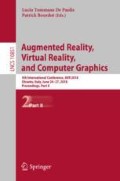Abstract
In this paper we present Puzzle Battle, an arcade VR-based serious game for promoting and reflect on the history of painting art. The idea behind Puzzle Battle is about to see famous artists like Van Gogh or Frida Kahlo fight against each other or against other artists from different eras, in a classic puzzle game. The player will have to impersonate an artist and play in a fun context where he will improve his historical knowledge about the artist and his works by taking advantage of current studies on immersive learning experiences with virtual reality.
Access this chapter
Tax calculation will be finalised at checkout
Purchases are for personal use only
References
Huizinga, J.: Homo Ludens: A Study of the Play-Element in Culture. Routledge & Kegan Paul, London (1949)
NewZoo: Europe, Amsterdam (2017). https://newzoo.com/solutions/standard/market-forecasts/global-games-market-report/
McGonigal, J.: Reality is Broken: Why Games Make Us Better and How They Can Change the World. Penguin Group, USA (2011)
Prensky, M.: The Digital Game-Based Learning. McGraw-Hill, New York (2001)
Ubisoft: Valiant Hearts: The Great War (2014). https://www.ubisoft.com/it-it/game/valiant-hearts/
Numinous Games: That Dragon, Cancer (2016). http://www.thatdragoncancer.com/
Abt, C.: Serious Games, University Press of America (1971)
Michael, D., Chen, S.: Serious Games: Games That Educate, Train, and Inform, Course Technology. Cengage Learning, Boston (2006)
Azuma, R.: A survey of Augmented Reality. Presence: Teleoperators Virtual Environ. 6, 355–385 (1997)
Martindale, J.: PlayStation VR dominates third-quarter VR headset sales (2017). https://www.digitaltrends.com/virtual-reality/playstationvr-outsells-htc-vive-oculus-rift/
Coccoli, M., Iacono, S., Vercelli, G.: Applying gamification techniques to enhance the effectiveness of video-lessons. J. e-Learn. Knowl. Soc. 11(3), 73–84 (2015)
Pajitnov, A., Pokhilko, V.: Tetris (1984)
Taito: Puzzle Bobble (1994)
Zyda, M.: From visual simulation to virtual reality to games. IEEE Comput. 38, 25–32 (2005)
Kapp, K., Blair, L., Mesch, R.: Gamification of learning and instruction fieldbook. Wiley, Hoboken (2013)
Butussi, F., Chittaro, L.: Effects of different types of virtual reality display on presence and learning in a safety training scenario. IEEE Trans. Vis. Comput. Graph. 24(2), 1063–1076 (2018)
Piaget, J.: Nachahmung, Spiel und Traum: die Entwicklung der Symbolfunktion beim, Klett-Cotta (1975)
Mishra, P., Foster, A.: The claims of games: a comprehensive review and directions for future research. In: Proceedings of 91 the 18th International Conference of the Society for Information Technology & Teacher Education, San Antonio, TX (2007)
Vogel, J., Vogel, D., Cannon-Bowers, J., Bowers, C., Muse, K., Wright, M.: Computer gaming and interactive simulations for learning: a meta-analysis. J. Educ. Comput. Res. 34(2), 229–243 (2006)
Dalgarno, B., Lee, M.J.: What are the learning affordances of 3-D virtual environments? Br. J. Educ. Technol. 41, 10–32 (2010)
Liu, M., Horton, L., Olmanson, J., Toprac, P.: A study of learning and motivation in a new media enriched environment for middle school science. Educ. Technol. Res. Devel. 59(2), 249–265 (2011)
Nakamura, J., Csikszentmihalyi, M.: The concept of flow. In: Flow and the Foundations of Positive Psychology, pp. 239–263. Springer, Dordrecht (2014). https://doi.org/10.1007/978-94-017-9088-8_16
Hunicke, R., Leblanc, M., Zubek, R.: MDA: a formal approach to game design and game research, In: Proceedings of the AAAI Workshop on Challenges in Game AI, vol. 4 (2004)
Hamari, J., Shernoff, D.J., Rowe, E., Coller, B., Asbell-Clark, J., Teon, Edwards T.: Challenging games help students learn: an empirical study on engagement, flow and immersion in game-based learning. Comput. Hum. Behav. 54, 170–179 (2016)
Author information
Authors and Affiliations
Corresponding author
Editor information
Editors and Affiliations
Rights and permissions
Copyright information
© 2018 Springer International Publishing AG, part of Springer Nature
About this paper
Cite this paper
Iacono, S., Zolezzi, D., Vercelli, G. (2018). Virtual Reality Arcade Game in Game-Based Learning for Cultural Heritage. In: De Paolis, L., Bourdot, P. (eds) Augmented Reality, Virtual Reality, and Computer Graphics. AVR 2018. Lecture Notes in Computer Science(), vol 10851. Springer, Cham. https://doi.org/10.1007/978-3-319-95282-6_28
Download citation
DOI: https://doi.org/10.1007/978-3-319-95282-6_28
Published:
Publisher Name: Springer, Cham
Print ISBN: 978-3-319-95281-9
Online ISBN: 978-3-319-95282-6
eBook Packages: Computer ScienceComputer Science (R0)

